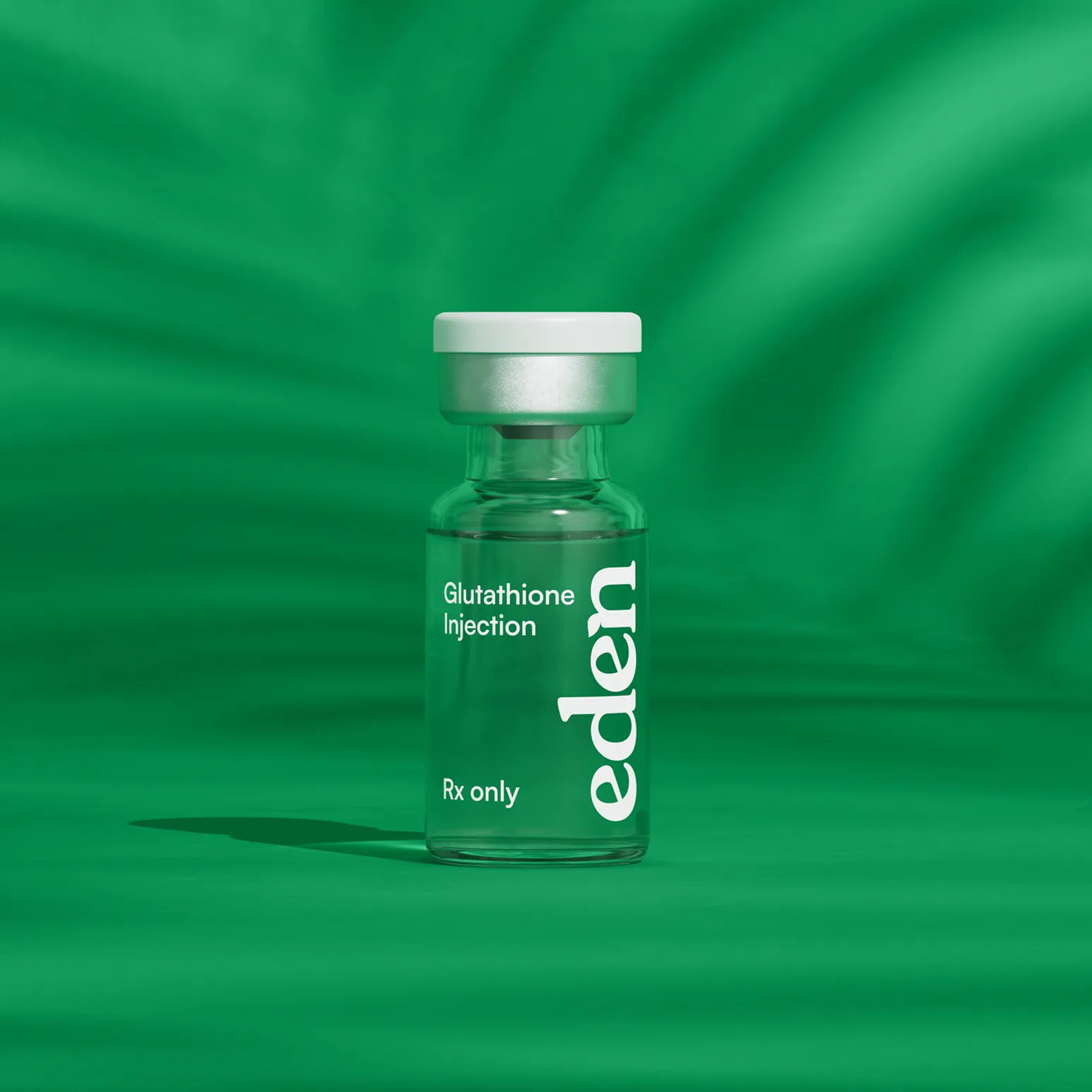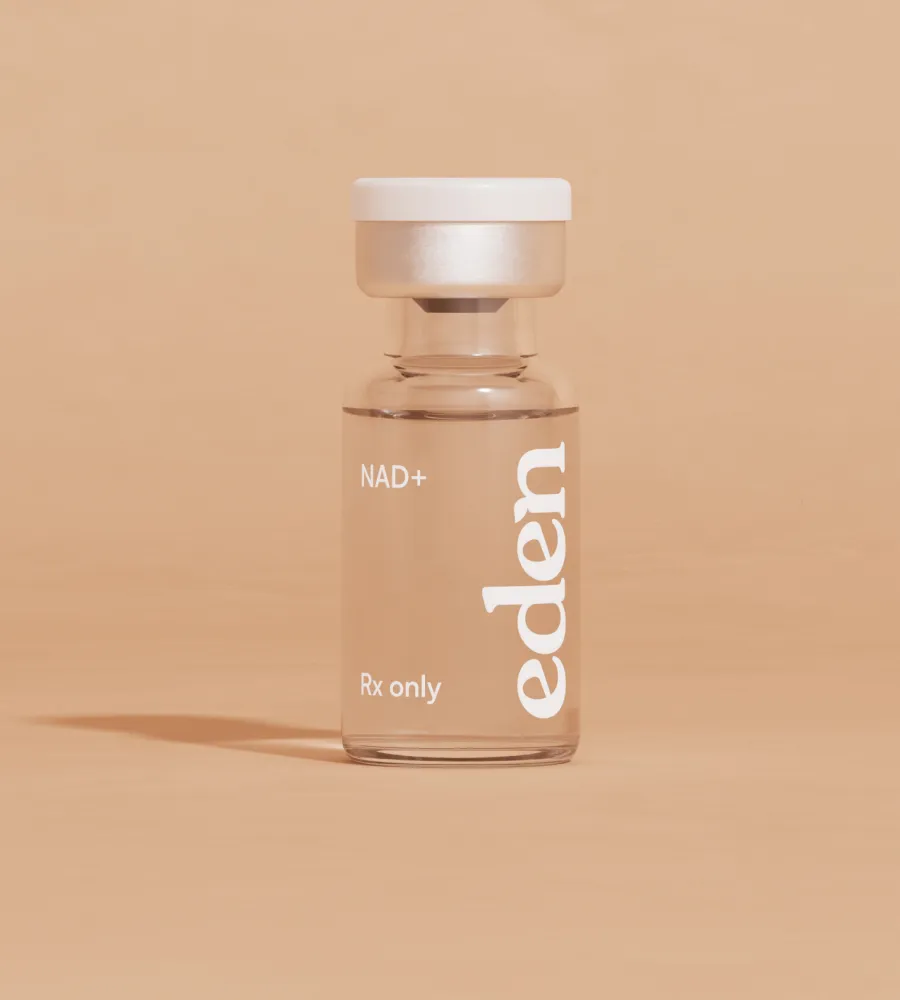Glutathione
Your goals, your plan
Glutathione is often called the “master antioxidant” for good reason: it plays a critical role in detoxifying the liver, flushing out heavy metals and environmental toxins, repairing damaged cells, and reducing oxidative stress throughout the body. These functions are essential for overall vitality, immune balance, cognitive health, and healthy aging. But as we age, our natural glutathione levels decline, and that drop doesn’t just show up in lab results. Replenish your body’s glutathione levels today.
Glutathione is a naturally occurring antioxidant involved in cellular processes, including detoxification and maintaining redox balance. Compounded GSH allows for personalized dosing under medical supervision.
Compounded GSH is not FDA-approved for specific conditions and is prescribed off-label by clinicians based on individual patient needs.
Boosting your body’s glutathione levels can support a wide range of health functions, from improving energy production and sharpening mental clarity to enhancing immune response and speeding recovery from physical or environmental stress. Because glutathione is central to detoxification and cellular repair, many users report feeling more resilient, focused, and energized over time. While individual results vary and depend on consistent use, increasing GSH is often a key part of long-term strategies for healthier aging, better metabolic function, and overall wellness.
The statements on this page have not been evaluated by the Food and Drug Administration. This product is not intended to diagnose, treat, cure or prevent any disease.
**The FDA does not review or approve any compounded medications for safety or effectiveness.
Personalized antioxidant support for your well-being
As we age, maintaining antioxidant levels becomes crucial. Eden’s compounded GSH is designed to support your body’s natural defenses and overall vitality.

Scientifically supported
Customized antioxidant formula
Support your wellness journey with Eden.
Personalized support
Tailored dosing to meet individual health goals.
Overall wellness
Assists in maintaining the body’s natural antioxidant defenses.
Clinician-guided care
Developed and monitored by healthcare professionals.

Why Glutathione matters, and why yours should be compounded
Glutathione is often called the “master antioxidant” for a reason. With regular use, many patients report sharper energy, better recovery, more resilience under stress, and even visible improvements in skin tone and clarity. When your cells work better, you feel better.
Your compounded Glutathione (GSH) formula isn’t off-the-shelf. It’s crafted specifically for your body, prescribed by a licensed physician after a personalized review. Because optimal health isn’t one-size-fits-all.
Lab tested medications for quality & potency
.webp)
Lab tested for quality & potency
Clean, simple, and effective
- Cruelty
Free - Eco
Friendly - Paraben
Free - Silicone
Free - Sulphate
Free - Gluten
Free
Hit your health goals safely & affordably in 3 simple steps
Submit your application and meet with a doctor
Step 3
Complete a quick form and meet with a licensed medical provider 100% online. They’ll determine if a personalized treatment plan is right for you.

Get your medication delivered at home
Step 3
If eligible, your custom prescription will be shipped directly to your door, fast and free.

Receive 24/7 support and ongoing care
Step 3
We’ll be with you every step of the way, with regular check-ins and on-demand medical support to keep you on track.

Eden helps people discover and then become the ideal version of themselves.
A well-functioning body is key to overall well-being, and access to evidence-based care empowers people to optimize their health and vitality. Eden democratizes access to physician-guided treatments that support people in achieving their health goals, helping them feel and perform at their best.”


Ready to feel like you again?
- 1-on-1 guidance from US-based health experts
- No-cost consultations for continuous treatment optimization
- Fast & reliable deliveries with 24/7 support available

Individual results may vary. Testimonials reflect personal experiences and do not guarantee outcomes.
Glutathione is a naturally occurring antioxidant involved in cellular processes, including detoxification and maintaining redox balance. Compounded GSH allows for personalized dosing under medical supervision.
Compounded GSH is not FDA-approved for specific conditions and is prescribed off-label by clinicians based on individual patient needs.
Boosting your body’s glutathione levels can support a wide range of health functions, from improving energy production and sharpening mental clarity to enhancing immune response and speeding recovery from physical or environmental stress. Because glutathione is central to detoxification and cellular repair, many users report feeling more resilient, focused, and energized over time. While individual results vary and depend on consistent use, increasing GSH is often a key part of long-term strategies for healthier aging, better metabolic function, and overall wellness.
Unlike over-the-counter options, compounded GSH is prescribed by a licensed provider and custom-formulated to match your unique health profile. This allows for targeted dosing and personalization that generic products can’t offer.
You'll start with a virtual visit through Eden. If appropriate, a licensed provider will prescribe a personalized glutathione formulation based on your goals and health history. Your medication will be shipped discreetly to your door, with transparent monthly pricing and no hidden fees.
Everyone’s experience is different. Some users report improved energy, better recovery, and clearer skin within a few weeks. Others may see more gradual benefits. Consistent use is key, and long-term supplementation may support healthier aging, mental clarity, and immune resilience.
Yes, under medical supervision. Glutathione is often used as part of a broader metabolic or longevity-focused regimen. Your provider can help you safely integrate it with other therapies.
Always consult your healthcare provider before using glutathione during pregnancy or while breastfeeding.
Side effects are uncommon, but some people may experience mild digestive discomfort. If you notice any unusual symptoms, speak with your healthcare provider right away.
You may also be interested in
Eden connects patients with licensed providers who may prescribe medication through state-licensed pharmacies. Prescription medication only available if prescribed after an online consultation with a healthcare provider. Physicians may prescribe compounded medications as needed to meet patient requirements or drug shortages. The FDA does not review or approve any compounded medications for safety or effectiveness. Results may vary. Plans are offered as a subscription service which you can cancel at any time. Actual product packaging may appear differently than shown.
Glutathione
- No hidden fees
- Personalized plans
- On-demand medical support
- Free expedited shipping

Only available if prescribed after an online consultation with a healthcare provider. Benefits outlined are based on third-party studies. Plans are offered as a subscription service which can be canceled at any time. Actual product packaging may appear differently than shown. Physicians may prescribe compounded medications as needed to meet patient requirements. The FDA does not review or approve any compounded medications for safety or effectiveness. The statements on this page have not been evaluated by the FDA. Results may vary. If you notice any side effects while using this treatment, contact your healthcare provider immediately.
- Wu G, Fang YZ, Yang S, Lupton JR, Turner ND. Glutathione metabolism and its implications for health. J Nutr. 2004 Mar;134(3):489–92.
- Forman HJ, Zhang H, Rinna A. Glutathione: Overview of its protective roles, measurement, and biosynthesis. Mol Aspects Med. 2009 Feb–Apr;30(1-2):1–12.
- Ballatori N, Krance SM, Notenboom S, Shi S, Tieu K, Hammond CL. Glutathione dysregulation and the etiology and progression of human diseases. Biol Chem. 2009 Mar;390(3):191–214.
- Lu SC. Regulation of glutathione synthesis. Mol Aspects Med. 2009 Feb–Apr;30(1-2):42–59.
- Pizzorno J. Glutathione! Integr Med (Encinitas). 2014 Feb;13(1):8–12.
- Allen J, Bradley RD. Effects of oral glutathione supplementation on systemic oxidative stress biomarkers in human volunteers. J Altern Complement Med. 2011 Sep;17(9):827–33.
- Richie JP Jr, Nichenametla S, Neidig W, et al. Randomized controlled trial of oral glutathione supplementation on body stores of glutathione. Eur J Nutr. 2015 Oct;54(8):2511–2
- Jones DP. Redox potential of GSH/GSSG couple: Assay and biological significance. Methods Enzymol. 2002;348:93–112
- Pompella A, Visvikis A, Paolicchi A, De Tata V, Casini AF. The changing faces of glutathione, a cellular protagonist. Biochem Pharmacol. 2003 Oct;66(8):1499–1503.































